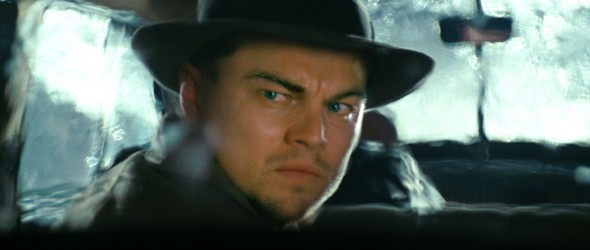Remember Cape Fear? Where Scorsese bombarded and frightened us with surreal images and a more-than-unsettling atmosphere? Shutter Island represents that side of Scorsese. It’s quite possibly his most tense film yet. While it’s difficult to label it as “scary”, it certainly knows how to make one feel consistently uneasy. This is a wonderfully crafted psychological horror film.
Teddy Daniels (Leonardo DiCaprio) is a federal marshal on an assignment to figure out the disappearance of an insane asylum patient by the name of Rachel Solando. This isn’t the most quaint or run-of-the-mill asylums, it’s on a closed-off island that harbors the criminally insane. Teddy took this assignment for personal reasons. He’s also been paired with a partner, Chuck Aule (Mark Ruffalo). Once they arrive, they realize that this is more than a “standard” investigation. The disappearance/escape of Rachel Solando does not add up. The doctors, the orderlies and the nurses don’t seem quite right. The asylum itself is an obvious hint that this isn’t any ordinary place– a very unsettling location that is practically a character in itself. Luckily for Teddy and Chuck, no one seems to be complying with their investigation and a hurricane keeps them cut off from the outside. They’re stranded in every way possible.
It’s a tad difficult to discuss the story fully without spoiling certain details, but no major spoilers will be revealed here. From the opening intro of the asylum it’s established that this isn’t going to be the typical investigation film, things are not going to go well for Teddy and Chuck. Shutter Island, in many ways, is similar to The Invasion of the Body Snatchers. It follows plenty of the same themes, features hauntingly beautiful imagery, and plays with one’s expectations. Three of those core themes are: paranoia, isolation, and, no different from most of Scorsese’s works, the violent nature of humanity.
Who do you trust? That’s something Teddy struggles with throughout. The orderlies and nurses are essentially pod people, drones for Dr. Cawley (Ben Kingsely)- the head doctor of the asylum. They all carry a sense of creepiness and a conformity feel. None of them standout and they all act as if they’re playing in some type of game, which makes sense due to the reveals later on in the film. For the commentary on human nature and violence, this is all about the varied extents people will go to figure something out or to continue their goal. There’s a pitch perfect exchange between Daniels and the Warden (Ted Levine) that represent this. It’s not exactly covering new ground, but it’s effective none-the-less.
As for the reveals, the main twist isn’t a mouth dropper, but it’s not intended to be. It’s not played for shock and awe, there are plenty of hints leading up to it that let you know what’s going on. This twist I speak of plays heavily into the last twenty minutes where the ambiguity is disappointingly lessened, except for the fantastic final moment with DiCaprio, which is where the most important question is left to the audience. There’s no right or wrong answer.
Teddy is an untrustworthy protagonist. He’s obviously the one you stick with, but due to his less than normal dream sequences and hallucinations you can’t quite always trust what you’re seeing. DiCaprio portrays this perfectly with a tough guy fashion. He carries a gruffness and a feeling of haunt- the haunt part is the key to Teddy. It’s a very theatrical performance in a sense that DiCaprio plays it in a very hard man 50’s type persona. This is not a slant, but a praise. This film was made in that way and DiCaprio’s performance fits perfectly into that world. Same goes for Mark Ruffalo who is, as always, somewhat underused. He carries a genuinely trustworthy feeling as the only character that is meant to be trusted and it’s a difficult task considering this is a film that delves heavily into isolation and distrust. Still, Ruffalo is excellent as always despite lacking enough screen time.
It would be a crime not to commend Kingsley, Max von Sydow, Michelle Williams, and Jackie Earle Haley on their performances since they help build this world of horror. Kingsley is creepy and elegant as usual, Sydow is simply creepy, and Williams marks an impression of sadness and eeriness with each flashback/hallucination.
Yes, Martin Scorsese is a master and one of the greatest geniuses working in film today. With that said, he’s turned in a film with no restraints as if he’s going all out. It’s not a classic like Taxi Driver, Goodfellas, Raging Bull, The Last Temptation of Christ, but why does that matter? That’s an unfair standard that many will implore as usual. This is Scorsese at his most unrelentingness. He uses plenty of shadows and a toned down color pallet to set the mundane and horrid tone. When the hallucinations come into play, Scorsese feels the screen with flourishing colors. This technique is used throughout and it could also assist those who try to distinguish reality from fantasy. There’s plenty of imagery that’s strikingly beautiful and yet utterly unsettling. From an incredible quick tracking shot of a firing squad to all the wonderful hallucinations, nearly every shot shows the true craftsmanship of an in control visual master.
For many, their enjoyment will be determined by the ending and whether or not they can fully embrace the climax. While many claim it’s predictable and doesn’t work, I’d argue it all adds up and it’s intentionally given away earlier on in the film. The best way to describe Shutter Island is as a feverish nightmare, one may say it takes leaps of logic, while others- including myself- believe it fits in perfectly with the previous events leading up to the reveal.


